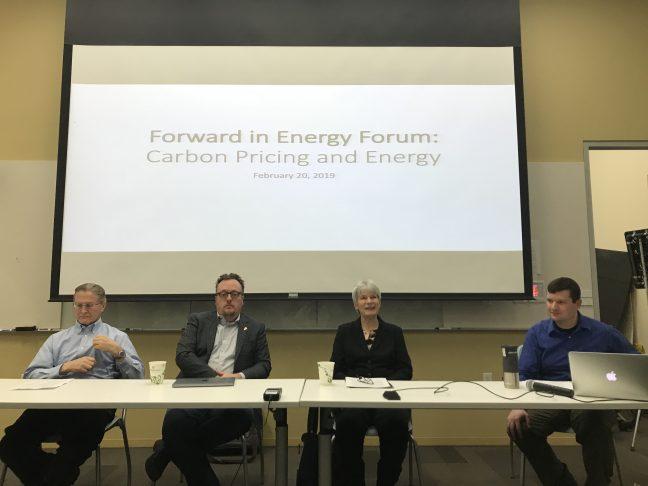The Forward in Energy Forum discussed carbon pricing — the idea of charging per ton of CO2 emission — and what barriers prevent it from becoming law Wednesday night.
The proposed Citzens’ Climate Lobby Carbon Fee and Dividend Policy is a national, revenue-neutral system with two basic steps, CCL Vice President Madeleine Para said. A fee would be placed on fossil fuels at the point when they enter the economy and the net revenues would then be returned equally to all households.
In 2018, members of the House of Representatives introduced the Energy Innovation and Carbon Dividend Act, which embodies the fee-and-dividend approach CCL proposed.
Professor says nuclear energy is safest, most practical energy source
The panel — which included experts in energy research, public policy and media relations — acknowledged that an increasingly partisan political climate has inhibited any carbon pricing legislation from being passed nationally. To challenge this, Para said the goal of the CCL is to “build a centrist, bipartisan organization” with the idea of “bringing both parties together.”
The panel also discussed how the portrayal of carbon pricing in the media may challenge legislative success by misleading public opinion.
University of Wisconsin Journalism and mass communications associate professor Michael Wagner said journalists often interview political elites rather than scientific elites when discussing carbon pricing, which frames it as an economic issue rather than an environmental issue.
Passing legislation on carbon pricing will be more difficult in the U.S. because climate change is still framed as a political debate, while other countries view it as a fact, Wagner said. Other nations consider carbon pricing a necessity rather than an option to reduce greenhouse gas emissions.
“There are lots of countries, in Western Europe for example, where there is not a debate over whether climate change is a problem,” Wagner said. “There is not a debate over whether we should do this, it’s a matter of how.”
University of Michigan professor of public policy Barry Rabe said the biggest obstacle for carbon pricing legislation is the economics involved. Even if the public supports the notion of climate change, it will be difficult for them to accept a higher price on “a commodity that is used by essentially all Americans.”
Can carbon be used for clean energy? One UW professor says it’s possible
The key to gaining public support for carbon pricing is to produce immediate benefits in addition to long-term environmental results, Rabe said. Using dividends, as proposed by the Energy Innovation and Carbon Dividend Act, is one way to go about this in order to sustain carbon pricing in an economic way.
“Some of the more successful systems have found a way to take money from fees and, with a powerful narrative, explain to groups and constituencies not just how the climate might be better off in 20 or 40 or 100 years, but how there might be some immediate benefits,” Rabe said. “One strategy … is to try to return the money through some kind of a dividend.”
Despite the political and economic challenges that carbon fees may face, UW professor of political economy David Weimer said Americans may come to accept carbon pricing once they see the example set by other countries. If Americans recognize that other people are bearing the cost of environmental policy in places like Norway and British Columbia, in which similar carbon pricing legislation has been imposed, they will be more willing to do the same.
The panel remained hopeful for the future of carbon pricing legislation. Rabe said despite hesitation in the past, more legislators are coming to accept climate change as a threat and are looking to arrive at a solution — such as that proposed by the Energy Innovation and Carbon Dividend Act.
“Climate concern is on the ascendency around the world but certainly in the U.S.,” Rabe said. “There is some — I would call it ‘softening up’ on the Republican side of the aisle — toward the idea of some kind of carbon price. There is real interest of how this might be part of some larger kind of agreement.”


















